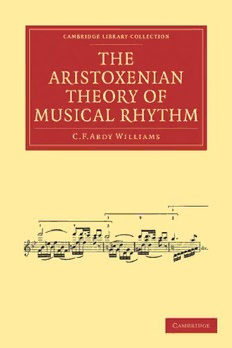
The Aristoxenian Theory of Musical Rhythm PDF
212 Pages·2009·7.543 MB·English
Most books are stored in the elastic cloud where traffic is expensive. For this reason, we have a limit on daily download.
Preview The Aristoxenian Theory of Musical Rhythm
Description:
'Keeping time', along with artistic accentuation and intelligent phrasing, is essential to successful musical performance. Rhythm alone had rarely been the subject of specialised study until the late nineteenth century, when several books on this topic by Rudolf Westphal were published in Leipzig. Westphal's work inspired Charles Francis Abdy Williams's 1911 book which is reissued here. Williams re-examines the classical and romantic repertoire from Handel to Tchaikovsky in the light of ancient Greek musical theory, focusing particularly on the earliest writings by Artistoxenus of Tarentum (fourth century BCE). In Williams's view, the rhythmic forms used by the Greeks are universally intelligible, and appear in all ages and cultures, unlike melodies or scales, which vary hugely. He provides insights into the microstructure of works including Bach's oratorios, Beethoven's sonatas and Schubert's songs, which will continue to intrigue musicians, classicists and mathematicians today.
See more
The list of books you might like
Most books are stored in the elastic cloud where traffic is expensive. For this reason, we have a limit on daily download.
